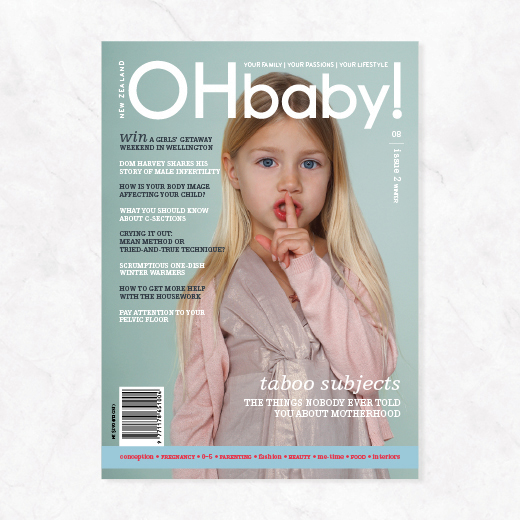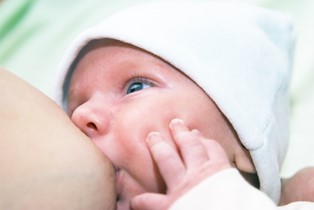Post Natal Depression: it's more than a mood swing

Picture a typical suburban neighbourhood. The streets are quiet, the lawns are well-kept, and there are flowers blooming in people's gardens. Here and there are signs of life - a dog playing fetch with his owner, a mum walking by with her baby in a pram, the paperboy delivering the local paper. The sky is blue, the sun is shining, and it's a beautiful day. Now take a closer look at the horizon - over every couple of houses, there's a big, black cloud just hanging there, disturbing the ambience, marring your vision of this picture-perfect neighbourhood.
That big, black cloud is postnatal depression (PND), and it is far more common than you might think. Research suggests that up to 15% of women develop PND in the months after the birth of a baby. And if it's left untreated, PND can worsen, negatively impacting not only on the mother and baby, but on the whole family.
MORE THAN A MOOD SWING
After having a baby, new mums often experience rather extreme mood swings. One minute they're deliriously happy about the miracle of their new little bundle of joy, and the next minute they're sobbing into a baby blanket, feeling overwhelmed and exhausted.
But PND is more than just a mood swing. It is prolonged and intense, and can cause the mums who are suffering from it to feel exhausted, anxious, and tearful all the time. It really is a big, black cloud that hangs over the woman for weeks on end, with no relief in sight.
In her 2007 book Finding Hope: A Journey through Postnatal Depression, Louise Frame writes, "The birth of a new baby is supposed to be a joyous occasion, a beautiful time, a celebration of new life. Unfortunately for some of us, the arrival of this new life leads us into a dark hole of depression.
The picture of how things are supposed to be is shattered. We are left feeling cheated and robbed of what we hoped would be one of the happiest times in our lives."
DIAGNOSING PND
There are several risk factors for PND. Lis Good, a childbirth educator, explains, "You don't just wake up one day feeling depressed. There are always contributing factors. Some women have a biochemical disorder that makes them predisposed to the condition. Many women are in challenging social situations, such as abusive relationships, lack of family support, personal or family history of depression. For a lot of women, the risk factors are there, and the birth of a baby, with all of its attendant challenges, is just the straw that breaks the camel's back."
SOME OF THE RISK FACTORS FOR DEVELOPING PND INCLUDE:
• Past history of depression or mental health issues, either personally or in the family.
• Relationship difficulties, especially with the father of the baby.
• A lack of support from family or the baby's father.
• Life stresses such as worry over money, recently moving house, worry over a close relative's health, or the recent death of a loved one.
• Feelings of disappointment or shock relating to the birth, especially if medical intervention (such as a C-section) was necessary.
• Anxiety over the baby's health, either because of congenital conditions or other factors such as premature birth, low birth weight, failure to thrive, etc.
• Feeding difficulties, such as low milk supply, reflux, or painful breastfeeding.
• Difficulty reconciling the reality of life with the baby to previous expectations.
• Exhaustion and sleep difficulties.
THE BIG THREE
Three types of depression can occur following the birth of a child:
• The "baby blues" involve a brief period where the mother feels "down" and tearful during the first week after the baby is born. The baby blues are associated with hormonal changes and are very common, and usually dissipate within 10 days after the baby's birth.
• Postnatal depression (PND) is much more serious. It occurs when the mum becomes seriously depressed in the first few months following the baby's birth.
• Postnatal psychosis (also called postpartum psychosis) is extremely serious, and also relatively rare. It involves symptoms of psychosis (being "out of touch" with reality) and dramatic mood changes. Postnatal psychosis usually begins in the first two weeks after the baby's birth.
COPING WITH PND
There is no single, one-size-fits-all treatment for PND. What works for you may not work for someone else, and it may take a combination of things to help you get through PND. The first and most important step is to talk about it. Tell your partner, close friend, mother, midwife, GP, or Plunket nurse how you're feeling. "It's incredibly hard for women to reach out," Lis Good acknowledges. "We're so used to being everything to everyone, that to admit we need help is almost like an admission of failure. But we need to remember - if Mum isn't happy, then no one is happy. That should be our motivation for asking for help."
Antidepressant medication is one option for treating PND, and there are antidepressants that are safe for breastfeeding mothers. Counselling and psychotherapy are also incredibly valuable, whether used in conjunction with antidepressants or utilised on their own. Support groups and therapy groups are an excellent option, especially if you're not comfortable in one-on-one situations. Hearing from other women who are in the same boat as you are is very important, Lis says. It helps to normalise what you are going through, and gives you hope.
Changes to diet and exercise may seem difficult, but are important, especially if your eating habits have changed for the worse or you're not getting any exercise at all. It may seem counter-intuitive to exercise when you feel so exhausted, but the emotional benefits of exercise can make a real difference.
Another important area to look at, and one that Lis believes is often neglected, is your social situation. Do you have enough support to help you with the baby and with your own emotional fitness? Are you in a relationship that is negatively impacting your mental health? Are there drugs or alcohol involved? These are all factors that can contribute to PND, and should be addressed along with any biological contributors, like history of depression or mental illness in your own life or in your family.
WHERE TO GO FOR HELP
As the seriousness of PND gains recognition in New Zealand, more resources are becoming available for women to seek help.
• www.mothersmatter.co.nz is New Zealand's most comprehensive site on PND, antenatal depression and anxiety. They have an extensive list of support contacts throughout New Zealand.
• The Mental Health Foundation (www.mentalhealth.org.nz) has excellent resources on PND and its treatment.
• The Post Natal Distress Network is a support network that has been running for over a decade in West Auckland. Phone (09) 836 6967 or email pnd.org@xtra.co.nz for information about the support group.

AS FEATURED IN ISSUE 2 OF OHbaby! MAGAZINE. CHECK OUT OTHER ARTICLES IN THIS ISSUE BELOW

















